Hey subscribers; for some reason the email didn’t go out when I posted a new blog today. Please follow the link below if you would like to read it.
Thanks!
Hey subscribers; for some reason the email didn’t go out when I posted a new blog today. Please follow the link below if you would like to read it.
Thanks!
Sorry its been the longest since you’ve seen a new post on here. Trust me I have excuses! My best one is that lightning hit my hut and fried all my cords. So, I had no way of charging my computer for 2+ months until one arrived in the mail from my sweet mother. Thanks mom!
I’ll start with all the cliche messages of my past blogs posts about how I’m feeling… “time is flying, I love it here & I’m just so sick of peeing in a bucket” because all apply to my life still. Just so I don’t go over board with this post I’m limiting myself to three, no four topics of choice. Enjoy!
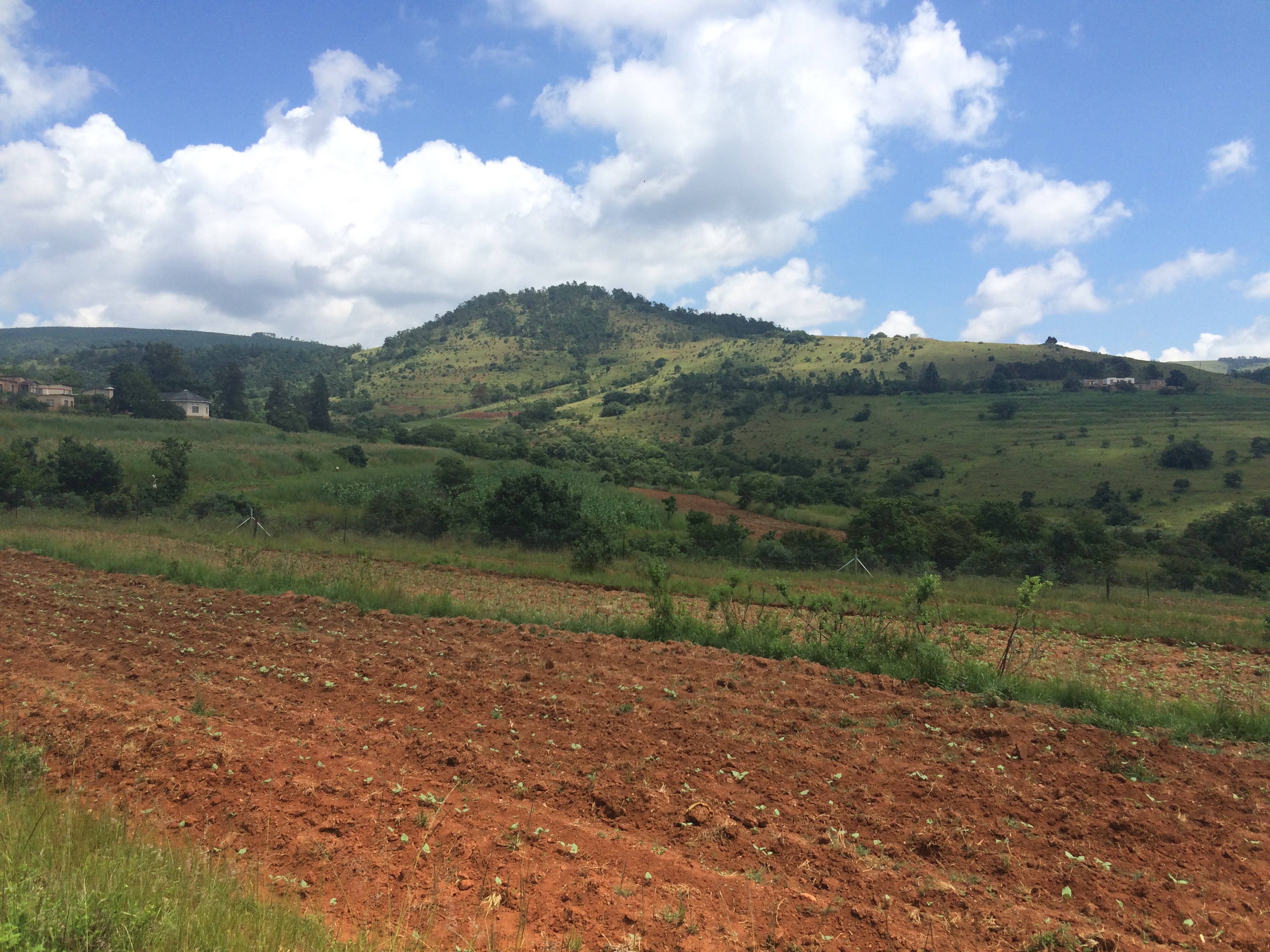
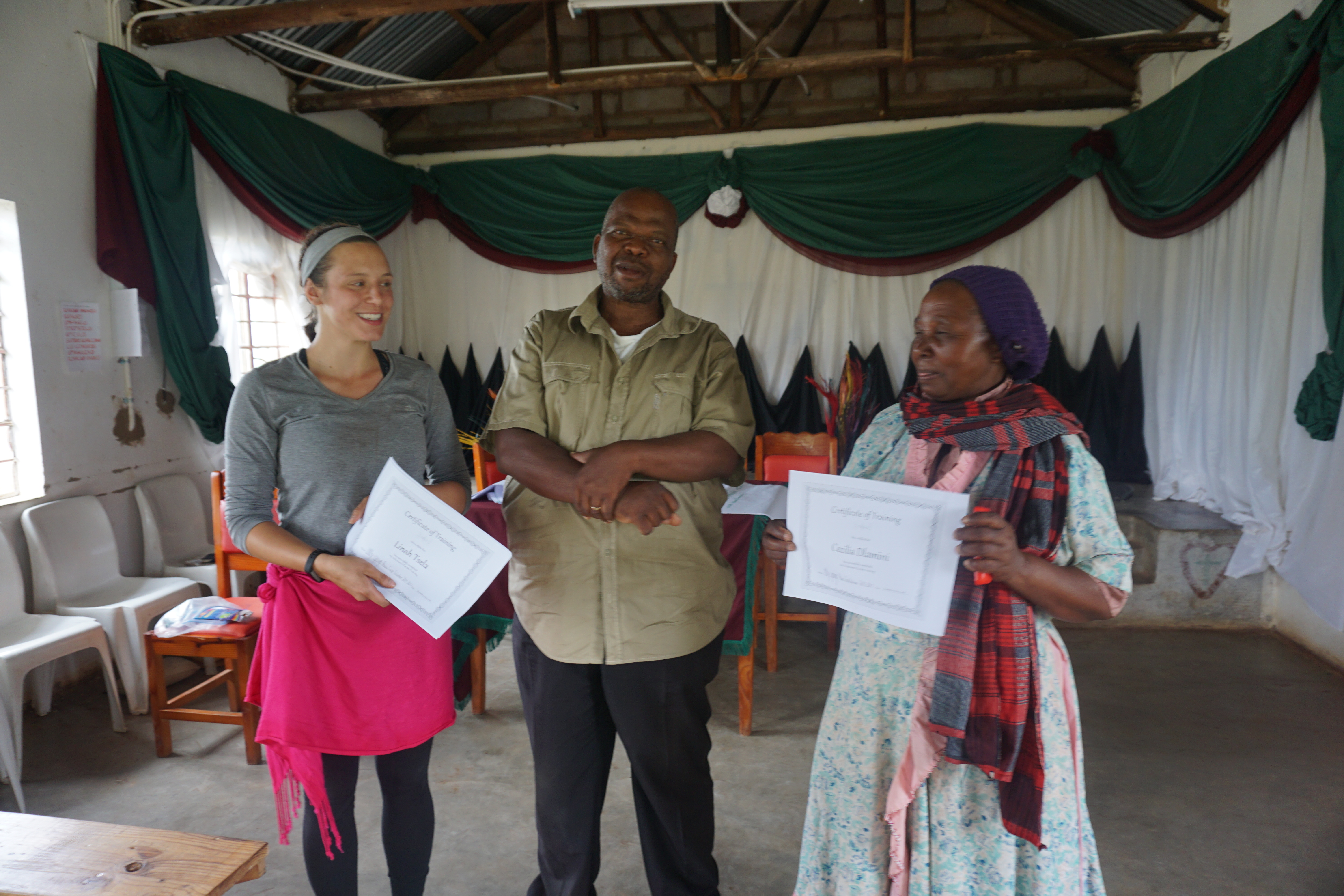
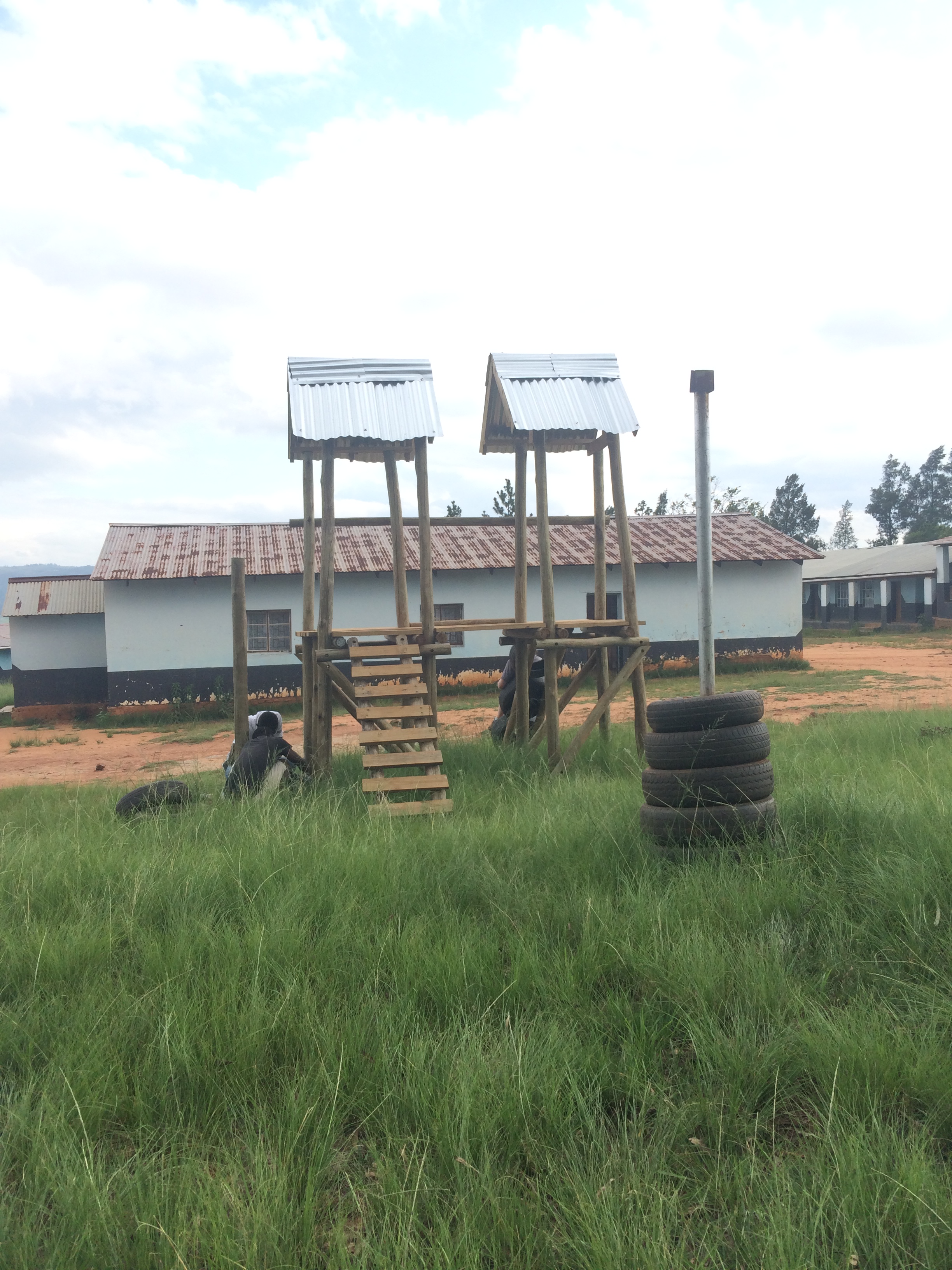
When you are deciding if you want to commit 2.5 years of your life to something, a smart person would research the hell out of it before making that choice. Common questions to come up would be “What would a normal day in the life look like?” “Where will I live?, What will I eat? Will I have electricity or running water?” Obviously moving your life to a foreign country deploys a lot of questions. PUN INTENDED. For peace corps, a lot of those questions cannot be answered as specifically as you would want them to be. This is because in Peace Corps service each continent, country, and site is VERY different from on another.
If I were to give advice to anybody wanting to join the peace corps I would say that you need to be okay with the reality of your life being one of these two different scenarios— or anywhere in-between.
1. You wake up every morning to a lot to do. You live near a town and have access to services for people in your community. You are working with NGO’s and have a strict schedule to adhere to. This “you have a lot of free time in the peace corps” does not apply to you. You work very hard for two years, just like you did in the states but the only difference maybe you may not have a shower at the end of the day. By the end of your service you can look back and see the changes and impact that you have made.
2. You wake up to no alarm, look at your iPhone calendar app and there is nothing planned for the next two weeks. The two community meetings you set up fell through because it was raining and people were feeling “too lazy” to come. You have thoughts like “I have no idea what I’m doing here & what good impact I will make”. You feel guilty when people back home say you’re “saving the world” when in reality all you did today was watch a season of the office and hung out with your host family. What you will take away from your 27 MONTHS of service is the fact that your 12 year old sister comes in your house every night to complete her homework. Her english has gotten dramatically better since you arrived. Her grades have gone up & you reward her with sweets every time she comes back home with a grade higher than 70%. You changed one Childs life for the better and thats an okay way to spend two years of your life.
A harsh reality of Peace Corps service is that you very well could make more of an “impact” with your knowledge and skill set back in the US than in your Peace Corps service.
It has been confirmed that my site will be replaced. This means a new volunteer will move in with my family in September and work as I did in the community of Velezizweni. Weird thought, but excited for the next person that gets to experience the love of my Gogo & the beautiful landscapes every morning.
On to the next; I close my peace corps service on August 11th, 2017! Party! This is a serious accomplishment for me these coming months will defiantly be a bitter sweet time closing up projects and saying goodbye to my Swazi home. I hope, aspire, want to come back in about 10 years. After service I will be traveling throughout south east Asia for four months until mid-December. THEN hey y’all, I’ll be home for christmas with a tan of course 🙂 From there I will be attending grad school starting in June 2018. Super excited for what the future holds and to be eating good food from August forward.
P.S. I have been enjoying writing letters as of recently, so please send me some mail! (its super cheep and a fun way to old school communicate)
Ally Young, PCV
P.O. Box 2729
Mbabane H100, Swaziland, Africa
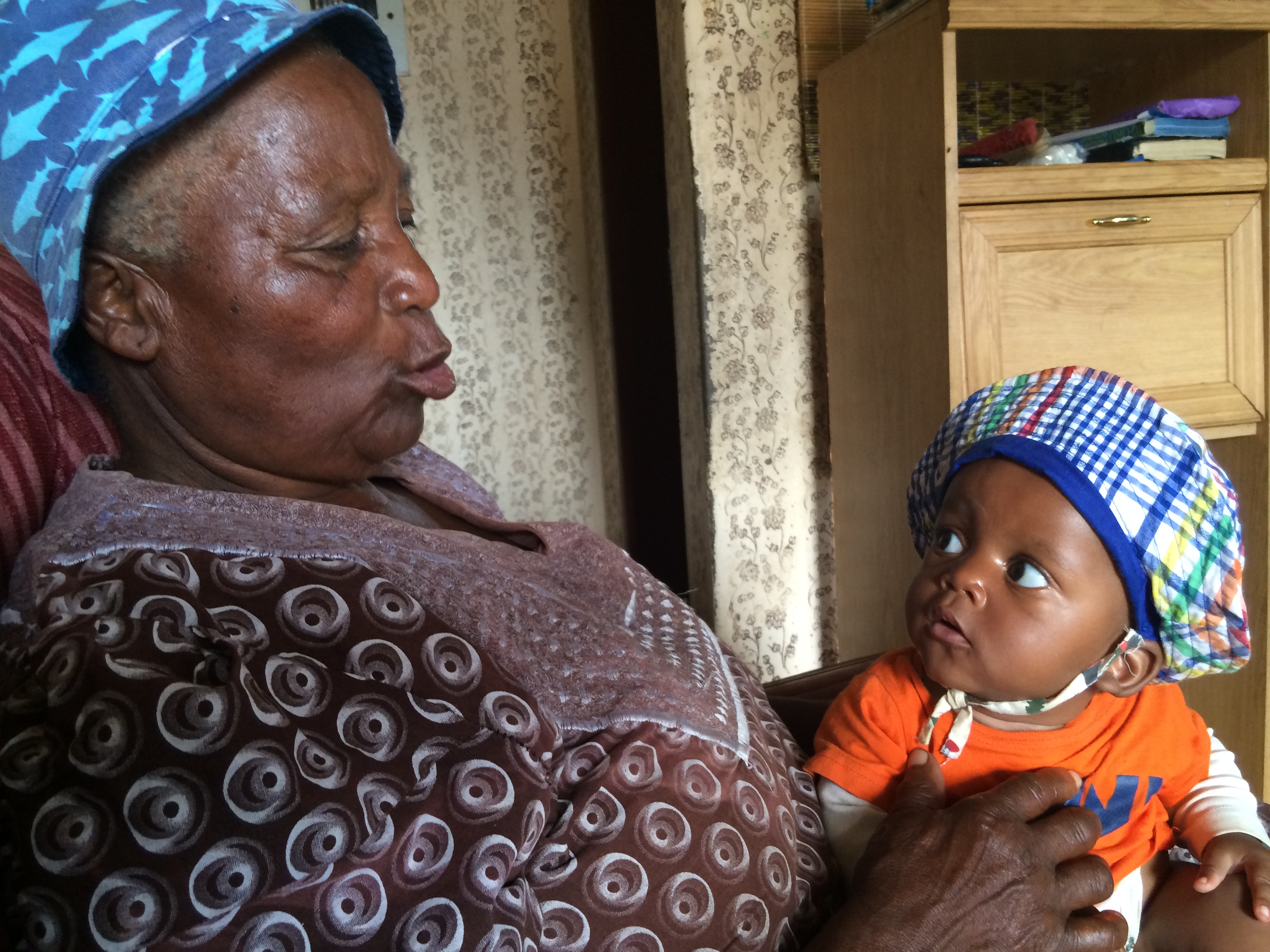
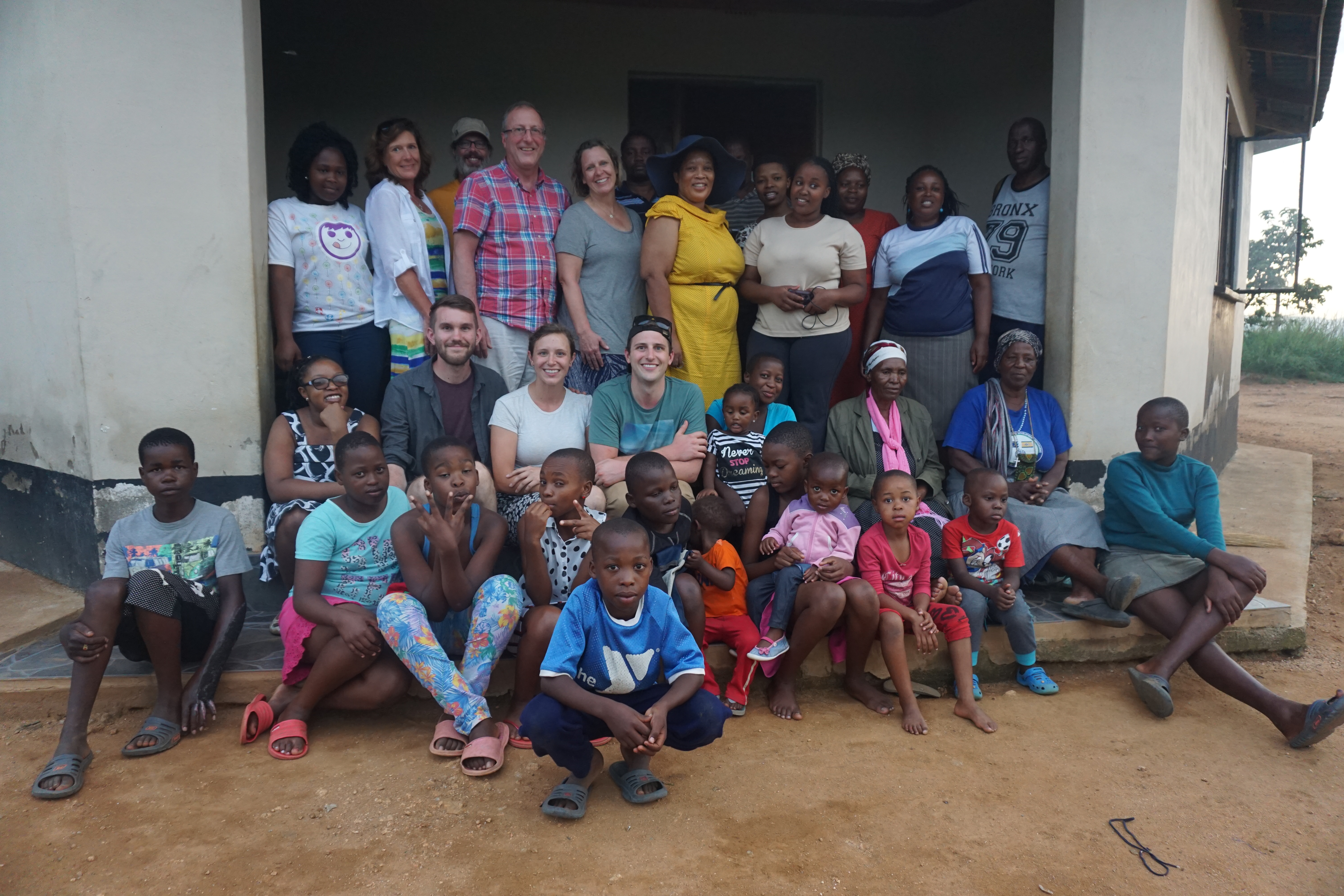
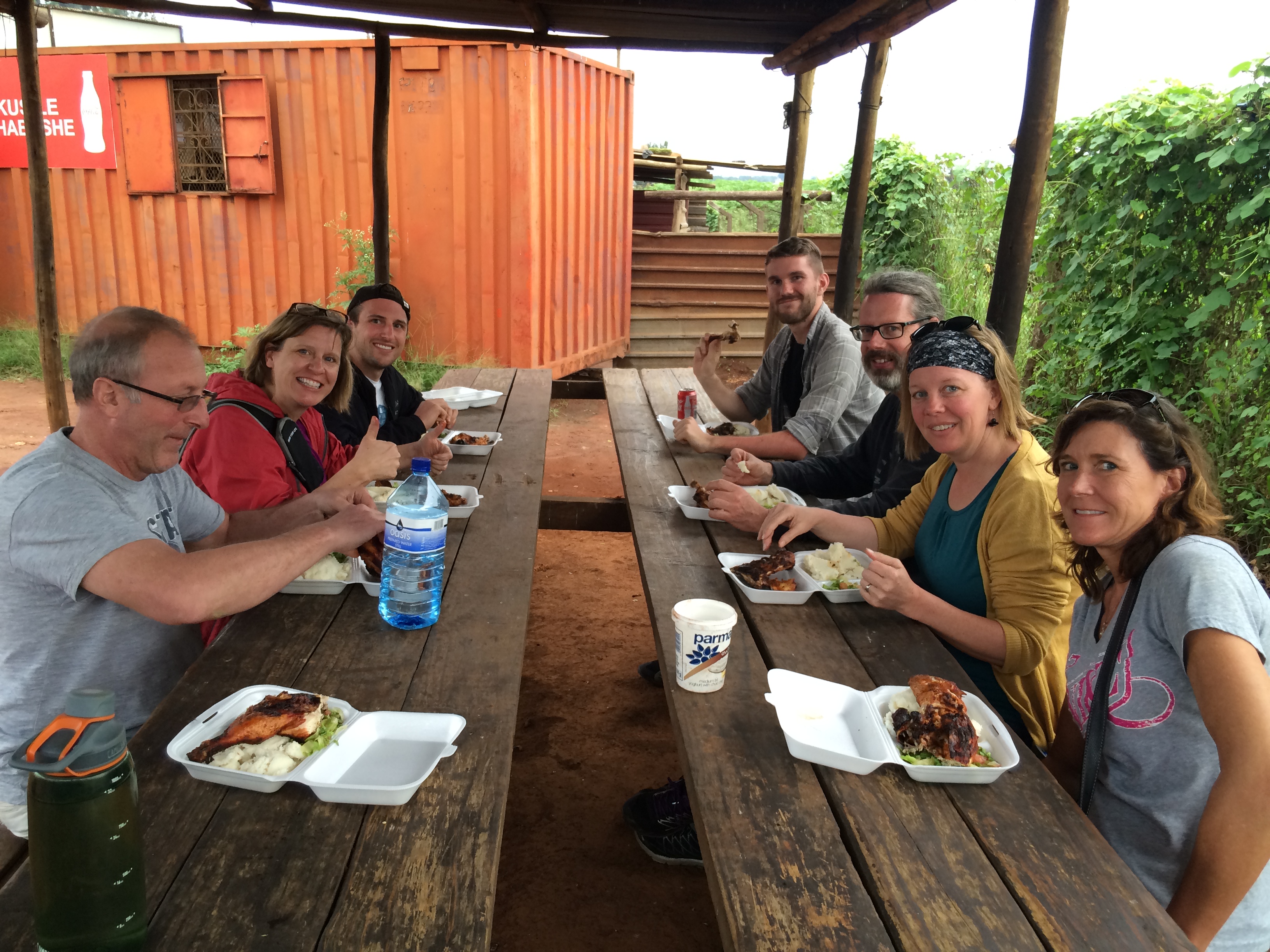
Hello family, friends, and followers alike!
One of the projects I’m working hard on here in Swaziland is creating a library at the primary school I work with. Velezizweni primary school has never had a library before and has never attempted to start the process. So, it has taken a lot to get the acceptance of teachers, school commitee & the head teacher to get this project going! We have now acquired a room where the library will go & have raised over E3,000 for shelves for books. I’m super proud of the library commitee for continuing to raise money, even when I’m not around.
We will be getting our books from “Books for Africa”. Books for Africa (BFA) is an organization in the United States that collects, sorts, ships, and distributes books to students of all ages in Africa. Their goal is to end the book famine in Africa. Peace Corps Swaziland partners with BFA once a year to bring in 30,000 books to 30 different schools/organizations across rural Swaziland. These schools/organizations have never had books or libraries before and once this project is completed the children in that area will have libraries and access to all of these books! Each individual library has a Swazi counterpart that works with a Peace Corps Volunteer (PCV), and each Swazi counterpart will attend a workshop on library setup and maintenance put on by Peace Corps Swaziland. This aspect of the project is what makes BFA Swaziland so successful and sustainable!
These books and libraries are so important for Swazi youth. In Swaziland English is a requirement to pass any grade in Swaziland, and as I stated before most schools don’t have libraries. This means that if you help donate to this project you will be helping hundreds of students continue their education. Any donation amount is helpful!
NOW, that we will be ready for books come April 2017. We are asking for YOUR help back home to help raise the money to get the books over here. Please consider donating to Books for Africa, so we are able to get books in my library here!
https://donate.peacecorps.gov/donate/project/books-for-swaziland-2017/
*please comment with any questions you might have!
Ngiyabonga (Thank you) for your support!
After living in Swaziland for over a year now, here are some phrases or words I hear in my everyday life as a Peace Corps Volunteer.
“Hawu” pronounced (Howuuuu) **My personal favourite
A sign of disbelief, reacting to a what another person said or did. Example in response to a Swazi saying “they wish to go to america one day” Me: “You have to be in a plane for at least 20 hours to fly to the United States.” Swazi: “HAWU?!?! … okay I don’t want to go anymore.”
“NKhosi”, Of the King or other praise names
After a person has given something to you (can be anything from borrowing you a blanket to giving you a present) you would say Ngiyabong Nkhosi, which means thank you “of the king”. My last name here in Swaziland is Dlamini, which is a very common and royal last name. Dlamini is also the last name of the king here in Swaziland. So, the praise name for my last name is Nkhosi but other last names have different praise names to say in respect to your family name.
“Ngicela ungiphe shukela”, Please may you barrow me sugar
Almost every day I get a knock on my door with an adorable small child at the other end of the knock. This child is usually requesting to “barrow” something from me because their parent(s) need it. It could range anywhere from asking for a pencil, to watching a cartoon or a cup of rice. The difference is the word “borrowing” doesn’t mean the same as it does in American culture. If someone in the U.S. asked to barrow something I would expect it in return, but no such rule is true here in Swaziland. When someone asks to barrow rice, they will most likely eat it all 🙂
“Nigyaphila”, The response of “I’m fine”
In the native SiSwati language when you ask how someone is there are two options to answer with; Ngikona (I am here) or Ngiyaphela (I am fine). No one ever states a response other than these two. NEVER. There is no, I’m okay or I’m wonderful!.. always just “I’m fine”. This is true whether a swazi is speaking SiSwati or English.
“Uyakudla yini kudla kwe SiSwati?”, Do you cook/eat Swazi food?
When I’m meeting someone new, I tell them about myself and why I’m here. I could continue to tell them something that is obscure from the Swazi culture that I find interesting. Then the inevitable question of “Do you cook Swazi food at your house?!” always comes into the conversation. Swazi’s seem to be so interested in the fact that I have cooked porridge or rice with my family. I tell them I cook it with Gogo every week and they always burst out in a deep belly laugh. Never knew my cooking could bring such joy to people!
“Usati kakhulu SiSwati”, You are fluent in SiSwati
I get this whenever I greet someone in their mother tongue. I have the greetings down pat now and apparently that’s enough to be fluent in a language! I feel quite silly because I only said two phrases to them and I’m not a fluent speaker in SiSwati. They always continue to reassure me that I am in fact fluent speaker with no doubt in their minds, even when we have switched to english after finishing the greeting in SiSwati.
“Usidudla”, You have gotten big
I haven’t gain an enormous amount of weight here, but I am more.. plump or happy? —I like to call it, than I was in the states. Even though I eat a lot more vegetables here than I did at home, I still eat a lot more starches as well. If I wear a certain type of skirt that shows off my beautiful “happy” mid-section; I’m bound to get comments about my weight. It could start off with “Oh what happened to you Nobuhle? You are so big now!”, or they would simply say “Too much food for you Nobuhle”. Comparing this to american etiquette it is drastically different. A stranger would never comment on your figure even if you were drastically larger than the average american.
“Yini lokusebusweni?”, What is biting your face?
As of recently I had a bit of a fiasco with my acne. I got a meriena IUD placed in February of this year. Everything was fine until a few months ago when I started to get really bad pimples on my face from the change in hormones. During this time, Swazi strangers and friends alike would come up to me very concerned about the bug bites that were on my face. “What is biting you in the night?”, “The sun must be doing this to you”, or “What has happened to your face?” hahahah all I can do now is laugh, but every time I tried to explain acne to Swazi’s they didn’t understand and went back to their original conclusions of what was happening to my face. I guess Swazi’s have acne as well but the mere fact that they are black makes the zits less noticeable.
“Utowuba nemukhuhlane”, You will catch a cold!
On my homestead all the floors consist of a cement-like material. I’m always fine with sitting on the floor when we have visitors; or at the schools when I’m waiting on a teacher. I sit outside on the cement with no second thought. I’m always scolded by teachers, my Gogo or make that I will catch a cold when I sit on a surface like that. I must be wearing my shoes or be guarded by a grass mat to sit on or I will indefinitely catch a cold!
“Umshaya”, I will hit/ beat you
Now, this phrase isn’t ever directed at me because I assume they don’t know how I would take it. However, it is something I hear in everyday conversations in a variety of contexts. I can hear it in the primary school yard from a teacher to a student in the most serious manner, on public transport with two friends just messing around, or girlfriends referring to one another in casual conversation. Pretend fighting is something seen in the U.S., but beating each other is a topic of conversation that can always be heard here. Either way play beating and actual beating of children, animals, and colleges is apart of everyday life here.
Less than a year to go!
I’m busy these days with three distinct projects;
HIV support group grant
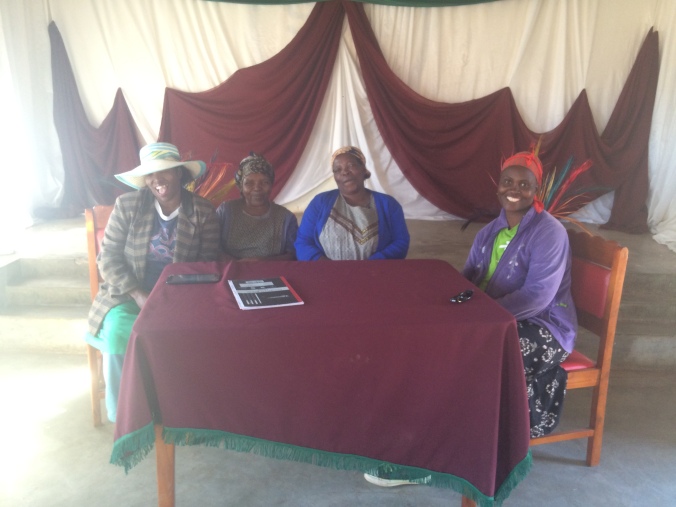
The committee members for the HIV support group, working on our grant!
:I’m working with a motivated HIV support group of women to build a garden. We have written a grant together to Peace Corps Washington for E28,568, which is about $2,050 US dollars. We are asking for fencing, water collection container and pipes to harvest water off a roof from a church that is next to the garden. We would have a two-day training where a retired professor from University of Swaziland that taught agriculture will teach this group of women how to garden efficiently. We are currently waiting for the grant to get approved, if it does then we will be implementing the garden in December!
Playgrounds
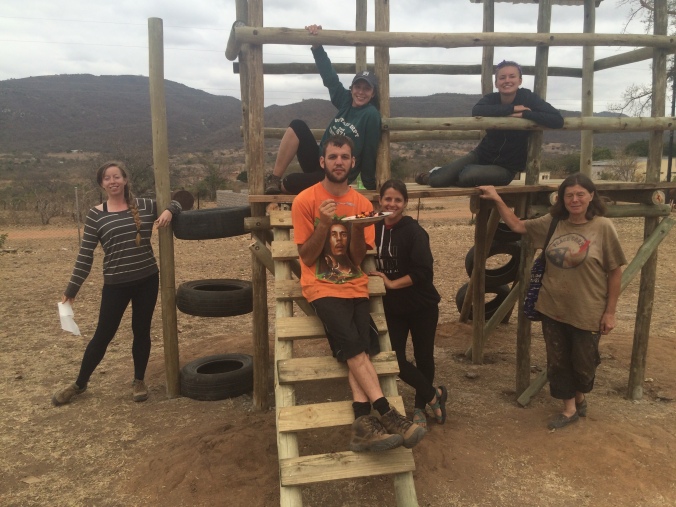
One of the towers we build for the playgrounds!
:25 playgrounds are being build by our group of volunteers in our separate communities. I have learned how to build a swing set & have built four playgrounds so far! We are building the playground in my community mid November! We are building it at the Primary school that is closest to me with over 300 kiddos! My community leadership has really taking a liking to this project and they hope to continue it over to the other 6 primary schools in my community.
Primary School Library
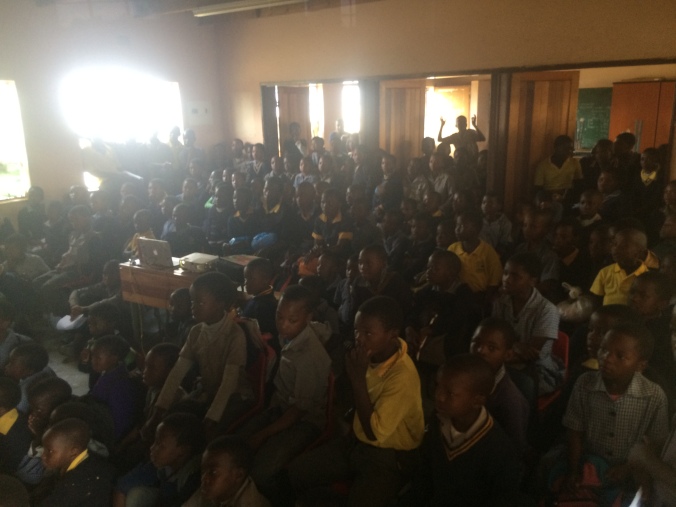
Children gathered at the Primary School to watch “The Lion King”to fundraise for their Library
: Fundraising is currently underway to build shelving for the library my primary school aspires to have. We have been fundraising for almost two months now by holding talent shows, movies, no uniform days & sending out forms to the parents of the kids to donate. So far we have raised over E1,000 (about $75) for shelves. The shelves alone cost E6,800 for just the materials to build them. We have a room for the library, but it is barren with no desks, shelves or anything to make the room into a library. Step-by-step we are hoping to get there!
Others; HIV testing events committee (we are developing an easy guide on how to host one in a volunteers community), girls empowerment group is on hold currently as the high schoolers are taking exams the next two months, implementing a wellness program for Peace Corps staff members, finishing up my responsibilities as a the volunteer news paper editor as I hand it off to the new group!
—It really feels like the meat of my service right now. With the half way point behind my group and I, time has never gone faster! People said two years is too long, but for me its seeming like the perfect amount of time. I’m not ready to leave yet, my projects aren’t complete and I still love my life here. My 12-year-old sister and I have never been closer and I honestly cannot imagine leaving her in less than a year from now. It hurts to think about my life after Peace Corps, since I will be leaving these people I love here one day without a return date in mind. At the same time its exciting to think about what the next step in my life holds! I have decided to travel from close of service until christmas of next year. Just over four months of solid traveling! I made this decision because I can’t foresee another time in my life where I’ll have no debt, no distinct responsibilities (job, house, husband, baby et.), not that any of those things are in my future, but they might be. I want to take advantage of this free time in my life to explore and do what my heart obviously adores. To WANDER WANDER WANDER, meet new people, see new places, drink good coffee and live out of my backpack with my camera on my hip!
Timing is everything sometimes.
On a Monday my (Swazi) grandmother tells me her granddaughter passed away.
That Friday my Grandfather from America passed away. On Saturday, just a day later, my Swazi family and I attended the funeral for the granddaughter. We were all, together, grieving a loss of a loved one. Losing a family member from the states while abroad is a very isolating feeling. Hearing my mom on the phone, hearing her pain, made me want to get on a plane back home. Fortunately, I was surrounded by my Swazi family, where there was love, laughter and a place to feel safe.
The story- I arrived home after a night away from my community, when my gogo came up to me and told me “Nobuhle, Tuliele has died” in SiSwati. I was caught off guard and didn’t know the appropriate response other than, I’m sorry gogo. Tuliele is my gogo’s grand daughter and a semi-frequent visitor on our homestead. The few moments after gogo told me the news, I remember that she just visited us all last week. Neighbors, family members from all around came to our homestead that week to sit and sing SiSwati mourning songs with my gogo. It was a somber time, and later that week I learned that the lady who passed had taken her own life. She left behind four children and a husband. My make told me the funeral was on Saturday and that I could join if I wanted. This was my first traditional Swazi funeral. The funeral was at another family member’s homestead, still in the community where I stay. We arrived, by car, at about 8am Saturday morning to start cooking. Over all, the aunties and I cooked four meals for over 60 people that were attending the funeral. Cooking was my main job for the entirety of the funeral that lasted for the whole day on Saturday, all night and until twelve noon on Sunday.
When I wasn’t cooking, I spent most of the free time I had talking to this enthusiastic girl. She really wanted to understand what it was like for me to live in the United States. Her big 12 year old eyes stared at me and asked, “No really tell me what a “normal” day was like for you there?”. I was shock because that is the first time I was asked a concrete question like that; instead of the normal, “do you know Obama?” or “One day I wish to go to America, so that I will be rich”. This 12- year old girl was asking me (I think) more eye-opening questions about my life from the USA than I have been asked in my whole service here. She asked other things like, “What were classes in college like?”, “How much does a person get paid?”. I talked to her for about an hour and was so impressed by her English and her poise as a young women. My make told me a few minutes after I began my cooking job again, that this 12 year old girl was one of the children who just lost her mother to suicide. Her mom didn’t die from cancer, or a car accident, she made the decision to end her own life. I thought, How is a girl, just starting to develop into a women going to handle that? All the aunties at the funeral kept saying “she will bounce back, she’s still young”. I hope the light and curiosity stays within her, and never stops asking those good questions.
How this traditional Swazi funeral started: The close family members most effected from the loss come to the homestead a week or so before the funeral, sometimes right after the death occurs. They all sleep in one room together on sleeping pads, mourning together day and night, until the day of burial. The funeral is a weekend event, people arrive anywhere from Friday to late morning on Saturday. Early Saturday, the men set up the large tent for the all-night vigil to be held in and dig the hole for the casket. The women, cook, clean & are always tending to those who are mourning in the large room. The guests enter in the house to the large room to greet them, cry with them and sympathize their great loss. The body arrives in the afternoon on Saturday and is set in the middle of the room where everyone is staying. At traditional Swazi funeral’s people believe the deceased body must rest a full night at home, before it is buried. Thus, why the funeral service is all throughout the night. When the night comes, dinner is served to everybody. Late night, about 10pm, the casket is opened for viewing. I tried to stay back during this process and for most of the service, as I said my own thoughts and prayers to my Grandfather who just passed.
The night vigil consisted of singing, drinking tea, and staying warm. At about 5am the casket with the body is brought down to the burial site. Most burials happen on the homestead in which the person lived. More singing, praying, and mourning take place there. The casket is then lowered into the ground, as men pile dirt on it and stomp the dirt down. I think that was the weirdest part for me, watching people stomp on top of the grave to pack the dirt down. The men that were doing it actually seemed to be dancing as they stomped their boots to pack down the dirt. A final prayer was said, during this all the women sit down as the men stand up. I didn’t ask why, maybe too tired to do so. Another serving of food was distributed as the people left and went home the next morning. Exhausted after being up for over 27 hours I slept the rest of the day on Sunday. In a way I felt closer to my family back home, as they were mourning, I was doing the same thing half a world away.
A few months ago I was sitting outside on my homestead, next to me was my Swazi mother (make). She was cooking some pap and chicken on the fire for dinner that evening. We were discussing her immediate family and how more than a quarter of the people on the very homestead, where I stay now, have passed away. The majority have been men and had passed away from AIDS.
My mother in Swaziland, “Make” pronounced (MA-GAY)
This conversation about her family members led my make to express, in her experience, how males in Swaziland are very resistant to outside help. She explained to me that rarely, if ever, males will go to a hospital or a clinic. The males try to treat the illness or injury at home first. To treat an illness or disease in rural Swaziland some families will visit the local traditional healer. At the traditional healer they receive traditional medicine or sometimes even use black magic to cure an illness. Mostly women go to the clinic if these locally sourced medicines don’t work, while the males will not seek out further treatment.
I’ve been told one of the main reasons men choose to not go to the clinics is because this is not seen as being a very masculine act. Traditionally, Men in Swaziland (& in many other countries) are seen as the “bread winners” or providers and take pride in being seen as emotionally & physically strong at all times. Part of these men wanting to be seen as strong, is that they will rarely ask for outside help especially when they have an illness. The males will hide themselves and sometimes progress in that illness without many people knowing. My Swazi make explains, that Swazi males going to the clinic for a check-up or treatment is seen as a weakness, an un-masculine act, by their families & society. This can also explain why there are very low HIV testing rates for males in Swaziland.
My Swazi make has seen this barrier to health care for men in a very personal way; she lost her husband to AIDS in 2007. She stated that her husband refused to go to the clinic and that he tried to use traditional medicine to “cure” himself of what she thought to be HIV. My make knows now that there is no “cure” for HIV.
After being tested a positive for HIV a patient will receive anti-viral medication that works as a wonder drug to fight the virus. Taking anti-viral’s properly & consistently put’s HIV at undetectable levels in a patient. To be able to get this wonder drug one must go to the hospital or mobile clinic to first get tested, then they receive a prescription of anti-viral medication each month. Therein lies the problem, if men never go to the clinic, there is a good chance that they would never get tested & treated. Testing positive for HIV = anti-viral’s which is needed to live a long healthy life with HIV.
Sometimes seen as a worse consequence of these men not getting tested, when positive, is the problem of spread HIV to their partners or whomever they are sleeping with. Men that don’t know their status and have HIV virus are at risk to pass it onto their partners without even knowing they are doing so. WhatsWhat’s the difference between HIV & AIDS? -Simply put a person who is HIV+ has the virus, and AIDS is when a person gets so sick that you could die from the virus . virus. From the time HIV is contracted to when it becomes AIDS is about a 10 year cycle, on average. This 10 year window is a large amount of time for males or females to pass on HIV to whom everwhomever they are having sex with. This is a sad reality in Swaziland and across the world that men’s ego gets in the way of them living a healthy life and in the long-term having a HIV free generation. —Okay, enough with the rant, but the this was the inspiration for my first project that has been completed from start to finish in Peace Corps.
Inspired by the discussion I had with my make, I talked with a leader in my community about bringing HIV testing to males in Velezizweni. We came up with the idea of trying to attract specifically the men to get tested with soccer! In many Aafrican countries, or world wide, football or soccer in aamerican terms is the most popular sport. In my large rural community alone we have over 12 local teams that play semi-regularly for fun. Community leadership and I came up with the idea of having a soccer tournament between four teams on Saturday’s with the focus of the event being on HIV testing. We would reciprocate this event three different Saturdays, three different locations and four new teams each weekend. The location would change, making the testing more assessableaccessible to my community at large. The men would be playing for the first prize of a goat (donated by the community leadership) & a second place prize of a brand new soccer ball.
I wanted this event to be easily reciprocated, so that my community was able to do this again when I am not present aka; a sustainable project! For this reason we decide to not do a grant and use all resources already found here in Swaziland. All three events were on three separate Saturdays in June. An organization called PSI (population services international) helped out immensely with this event. They provided free HIV testing, counselling, DJ & gave away over 10,000 condoms. I got the diabetes association of Swaziland abroad as well to do diabetes testing for adults and children. Many frustrations were involvked in the process of creating, maintaining, and follow-thru with the events. I tried to keep things in perspective and telling myself “all that matters is that people (especially males) get tested”. Keeping that in my mind, most of the problems I were took with a grain of salt and overall the project was a success!
*112 People tested for HIV in Velezizweni*
92 Males, 20 Females
8 People were Positive for HIV
82% of the people who were tested were Male
Males 10-17 = 12 Males (11% of the people who tested)
Males 17-25 = 50 Males (45% of the people who tested)
Males 25+ = 30 males (27% of the people who tested)
Females consisted of 17% of the people who tested
I couldn’t choose one, so here are my conclusions of the HIV testing events:
A Goat can encourages youth males to “Know their status”
“Bahhh know your status bro”
-Goat
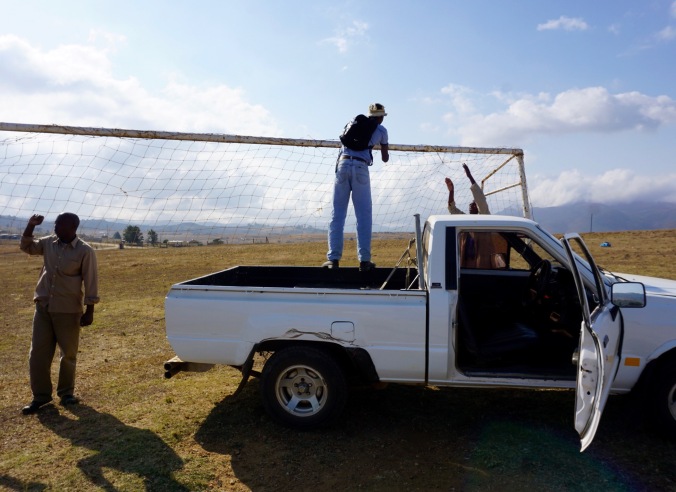

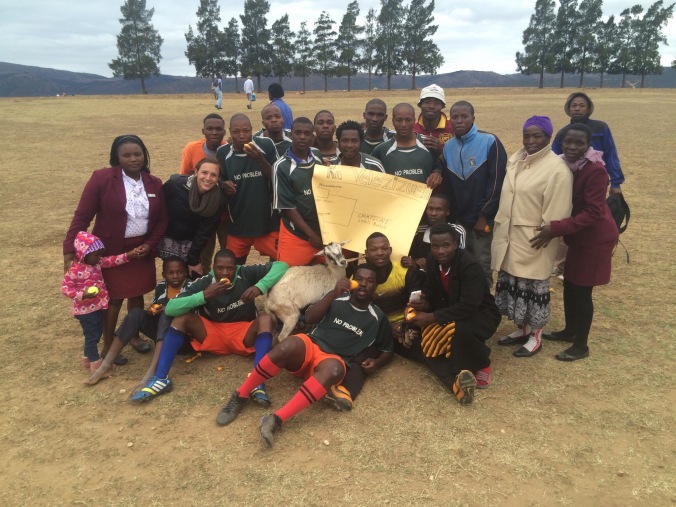


Ever wonder what it would be like if doing your laundry wasn’t as easy as plopping it in a machine and pressing go? Living here in Swaziland gave me no other option but to find out! Three things to know at first: this is my most dreaded chore here (because it takes the longest), adverse weather is not your friend (the wind WILL steal your clothing) & lastly you don’t get to dry your intimates on the line with everything else (too inappropriate for visitors on my homestead to be seeing my thong? .. Prob.) okay and last thing! Washers and dryers are amazing assets, so don’t be taking them for granted.
Today was my “wash day”. I call it this because it takes up a vast majority of my day. 9am I started the process and didn’t finish hanging my clothes on the line until 2pm, and this is without the time it takes of putting the clothes away after they dry.
I first go through my hamper and put back the clothes that don’t smell too bad, which ends up being only a few articles. I use my bathing tub to wash my clothes as it is the biggest. I procrastinate this task, so I usually do have a lot to wash. I fill the tub with my clothes & put hand washing powder on top. I carry this outside to my water tank, along with two other tubs that I use to rinse my clothes. This isn’t too far away from my hut. You can see my hut in the back of the photo.

From there I fill the bucket and churn my clothes like a washing machine. Then, I let it sit for an hour so stains will be removed with more ease.

Ally- this seems pretty simple what takes you so long?! .. Just think of every article of clothing you wear in a two week period, add in a lot of dirt & having to scrub them by hand. It’s not a hard task, but it is time consuming.
Lastly! Hanging them on the line to dry. I usually clean the heavier things first, such as my jeans or sweaters as they take longer to dry. In the winter the sun sets by 5pm, so I need the thick clothing on the line by at least 1pm for it to dry.
Lesson of the post- give your washer or dryer an extra tap on the metal next time you use it 🙂
“What was the craziest thing you have ever done?” This question was asked about a week ago at our mid-service training put on by Peace Corps. Each person had to write down their answer “secretly”, then the instructor would read them out as we guessed who it was. Sitting there, contemplating what my answer would be.. The first things that jump in my mind are sinking 30ft under water while suba-diving, throughly enjoying the taste of chicken intestines or running naked through the halls of a government building all seemed pretty crazy. Although, they weren’t the most insane things I’ve done in my 22 years here. The thing that far tops everything else in my life as the “craziest” is being a Peace Corps Volunteer. Being a volunteer is a whole other species of crazy that by far trumps the other nutty things I’ve done in my life. The *observed* cow poop drinking, bucket bathing, chicken killing, hitch-hiking, and a thousand proposals later… lifestyle I live now is pretty out of the ordinary from the American life I had before I became a Swazi. Cue the middle class white girl with supportive parents and a college degree in Social Work that wants to “change the world”. She never even knew how to polish her own cement floor or sweep the dirt in her homestead.
Along with the risks of living in a place outside from my comfort zone, comes rewards in the form of a dog named Tjani and the joy of meeting new people on a daily basis. Day after day the rewards greatly out weight the sacrifice in this beautiful country that I call home.
Recently, I have been going through a low point of not feeling accomplished and becoming uncomfortable to answer the question of “what are you doing there in Swaziland?” This shouldn’t be such a daunting question to answer as this is my only job for two years. I can ramble on about the activities I’m “trying” to start, but the short answer would be I have nothing concrete to show for the 11 months of my service so far.
This really hits deep when I have been give a lot of myself, trying my best with what I have to work with. This feeling of unachivement is emphasized when I hear about the successes of my fellow volunteers. “Don’t compare yourself to others”, YES yes I know, but it’s hard not to do so when the people you are comparing yourself to have been through all the same training as you and I really want to live up to what expectations I have set for myself. I’ve learned its not an even playing field when it comes to successes and failures of volunteers.
What I have gained this last week from mid-service training is the fact that I’m not the only one who is feeling this discouragement of projects not working out and still trying to find the right balance of my life here. Many MANY people in my group are struggling in the same ways I am (finding motivated people, keeping a new project sustainable, or dealing with the constant harassment from men). I felt tears of frustration and happiness let go as others explained to me the exact feelings I have been experiencing. Being secluded, miles away from a support system AND not feeling accomplished for the very reason I’m here are all exuberantly frustrating. These are not fun feelings to have, but of course they are ultimately apart of my time here. Coming together with other volunteers gives you that rejoicing feeling of “I’M NOT ALONE IN THIS!” For that I am so very grateful for my fellow volunteers here.
So, why is it so hard to get things done here, specifically in Swaziland?
Two Swaziland volunteers from our fellow group went to Zambia for an HIV bootcamp conference where another 12 Peace Corps countries were represented. They overwhelmingly learned that Peace Corps Swaziland, is one of the few countries that doesn’t pair the volunteers with existing organizations in country. The volunteers that attended the conference explained to us that almost all other countries pair their volunteers with NGO’s (nongovernmental organizations) to work alongside with in a rural community. I have had personal experience of this when meeting other PCV’s in Madagascar & Mozambique. Partnering us with NGO’s and already existing organizations would give us direction and structure in our communities that, I feel, we somewhat lack of right now. I’m sure there is good reason for this structure specially in Swaziland, but it’s something I struggle with even after being in my 11 month of service.
New volunteers are gladly dropped into communities in hopes of creating projects that the community needs and keeping it that simple. This sounds motivational as it is very “grass roots” and we as Peace Corps volunteers do not put our agendas first, but we put the needs of the community first and foremost. Some volunteers flourish in these conditions, but it seems to be the luck of the draw who is successful in their communities and who is not. A strong determination of a successful volunteer is made by the people and the leadership in the community in which you are placed. If you find motivated hard working people, then yes you can get a lot done. Otherwise you just have to keep trying until you get traction with something meanful and well supported in the community. We have to work within the framework of Peace Corps because that is what makes our projects sub stainable after we leave. In places like Swaziland, where we not paired with NGO’s, volunteers are responsible for finding people in the community that 1.) Have project ideas. 2.) Have time to work with you on the project 3.) Are motivated to continue the project after you leave 4.) Will do all of this for FREE. Finding a person or a “counterpart” for all four of these is a jackpot, and we volunteers brag about the motivated people we find in our communities. Super volunteer said, “There are youth in my community that have created a gardening project for the children in my village who are going hungry!” *AKA jackpot*.
Every time I return to my site from a few days in town, a vacation or a training I find myself needing to take a deep breath and look at my community with a fresh heart and mind. I do this to find a new sense of motivation and make sure I don’t have a bad attitude. I always enjoy the saying “Enjoy the ride!” and I will continue to do so.
*Project Progression*
“Velezizweni presents: HIV TESTING & SPORTS DAY”
A soon to be success story? I hope so 🙂
My two counterparts and I will be hosting three HIV testing events disguised as “sports days” to attract youth aged 12-32 (as this is the most vulnerable age for men and women). My community is large, so we are having the events on three consecutive Saturdays in June in three different “hot spots” in my community that have sports grounds (big open fields). Local soccer teams will be playing for the prize of a goat at each tournament. HIV testing will be free and available at each event along with HIV counseling and condom demonstrations. My hope is that if the free testing is available, and most importantly accessible, that the youth & adults will seize the opportunity to get tested. I have also contacted 5 outside organizations that have resources in Swaziland to join in on the event and promote their organization to my community. So, let the games (& testing) BEGIN!
NCP/ Preschool Construction
A person in the leadership council in Velezizweni brought in two Bomake for a meeting with me. They said they have been struggling with completing a preschool structure that is really needed in the village. I am starting to help them by writing a grant through Peace Corps with them to complete the construction. I’m excited because these are people who are already motivated and want to work with me!
GLOW
My fantastic GLOW club is on hold currently as my student helper is facing disaplinary action from the High School. SO will be trying to find a new person to work with.
—
-I’ll try to keep updating more! It’s my birthday this weekend & there is the biggest Southern Africa music festival in Swaziland this weekend! Over 20,000 people are traveling to Swaziland for the event. Lots of other PCV’s from other countries will also be joining us, so it will be a good time 🙂
I’ve officially been surfing in Hawaii, Australia, and Madagascar all before I turned 23. One could say I’ve lived a pretty good life!
Thanks everyone for the love and support
“The best journeys answer questions that in the beginning you didn’t even think to ask” – Jeff Johnson
Madagascar;
I started my journey at 5:15am taking a Kombi from my community to the main town of Manzini. From there I traveled to South Africa on public transport. It’s about a 5 hour ride to the main airport in Johanusburg. I met up with the other 7 Peace Corps volunteers I went on this journey with to then board another plane to Kenya. Then finally landing on the island country of Madagascar.
First impressions:
This country has very little American influence and unlike any country I’ve been to before. It definitely didn’t seem like I was in Africa anymore; more like in Asian country with European influences (most people spoke & street signs were in French). The people of Madagascar are called Malagasy people and most speak two languages; French and Malagasy. French is taught in all schools since the country was colonized by the French. There was political unrest in the country until 2009 to what degree of this in unsure. One thing that was very apparent was the concentration of people in the communities and cities we passed through. We drove for a minimum of 4 hours each of the 11 days. Dip and diving though curvy rural roads and about every 30min we would run into dense villages of people, then back to grassy countryside of no development. There is one paved road that guided us through most of the country where we were joined with semi trucks and a lot of bikes. Malagasy people always seemed to be out and about; working in their rice or veggie fields or engaging in a friendly foosball game and you could alway find someone growing, harvesting, drying or eatting rice. The small villages seemed to have very little development but the happiness of the people was easily seen.
The ground seemed to be with very fertile with lush crops. We ran into a “movie on the lawn” in one village we passed through. The villages seemed to have a very community feel, where everybody knows everybody. Each person has their job and each job goes towards the common good of the community. As a volunteer I know that it’s easy to see the good at first glance, but I’m sure the communities have their own struggles as the Swazi’s do.
What we did:
-Hiked through a volcanic lake

-Walked through two national forests one was a RAIN forest… Forgot my rain coat sadly. Both were reserves and saw 6 of the nations different species of lemur
– Saw baobaba avenue and watched the sunset


 – Canoed to three different lemur islands to feed them bananas
– Canoed to three different lemur islands to feed them bananas

– Viewed a mammal exhibit that shows all the different types of spiders, geckos, frogs, snakes, and camilliions that exists in Madagascar.
– had a Malagasy native message
– volcanic sand body exfoliation (for free!)
– surfed & body boarded with locals (now I have been surfing in Hawaii, Australia, & Madagascar!)
– ate my to my hearts content traditional Malagasy food; duck, duck liver, pig ear, zebo, steak, pizza (which is amazing there), Malagasy DARK chocolate, and a lot of rice.

I’m so happy I had the opportunity to travel here and learn all about Madagascar with some wonderful people.
